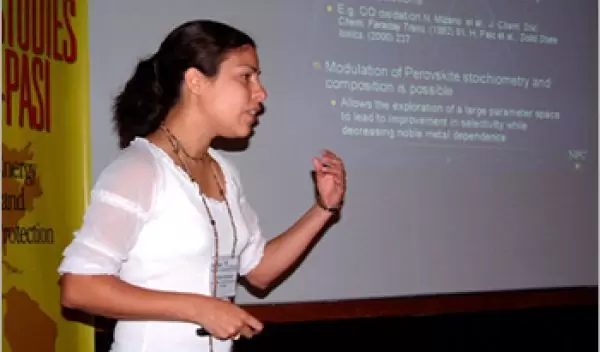
Fueling Ideas in Global Environmental Collaboration
Robert P. H. Chang is committed to creating the next generation of scientific leaders while fostering an atmosphere of global and interdisciplinary collaboration in the materials science research community.
Materials science is the merged study of the science and technology of metallurgy, ceramics and polymers. Many of the technological advances we enjoy today--from fiber optics and high-speed computer chips to nanotechnology and fuel cells--resulted from materials science research.
Chang, the director of the Materials Research Institute at Northwestern University and a professor of materials science and engineering, organized a Pan-American Advanced Studies Institute (PASI) on the topic of materials for energy conversion and environmental protection in Rio de Janeiro, Brazil, in October 2003. The National Science Foundation's (NSF) Office of International Science and Engineering funds several Pan-American Advanced Studies Institutes each year on diverse topics ranging from quantum physics to climate change in the Americas. Chang's PASI, which was jointly funded by NSF, the Department of Energy and the Army Research Office, united 40 American and international graduate and post-doctoral students with 20 of the world's top experts in energy conservation, energy storage and environmental remediation. Together, through intensive lectures and collaborative research projects, participants shared information and considered new materials and ideas for hydrogen generation and storage, fuel cell design and emissions reduction.
As a renewable source of "clean" energy with near-zero net greenhouse gas emissions, hydrogen is widely considered an attractive fossil fuel alternative. The challenge in fuel cell technology lies in efficiently and cost-effectively creating, storing and extracting hydrogen energy. Solving this challenge is especially relevant as American and Brazilian cities like New York, Los Angeles, São Paulo and Belo Horizonte struggle with some of the world's worst air pollution.
Chang believes that shared leadership and cooperation between academia, government and industry is as critical to solving the world's energy and pollution challenges as the scientific breakthroughs themselves. Equally renowned as both a distinguished materials research expert and an innovative educator, Chang has a long-standing record of NSF support for developing creative and effective curricula for materials science, starting with the Materials World Modules program for middle and high school students in 1993 and the first NSF Research Experience for Teachers program.
In 2005, NSF honored Chang as one of seven Director's Distinguished Teaching Scholars, citing his groundbreaking results in materials research and nanotechnology, exceptional teaching skills and significant educational contributions. The 2003 institute in Rio de Janeiro is an example of Chang's success in combining materials research, international collaboration and fostering a new generation of scientific leaders.
"What made our PASI so unique were the afternoon roundtable sessions where we asked the senior researchers and policy makers to go beyond their traditional role as lecturers and become project mentors," says Chang. "We also looked for leadership qualities in the student candidates selected to participate, with the goal of exposing talented young researchers to the concepts of leading, working and collaborating internationally. I was amazed by the students' enthusiasm--they really worked long hours on their projects despite the proximity of Rio's famous beaches!"
Jennifer Moncel worked with Chang to implement the PASI. "Our focus was more on long-term impact rather than short-term information exchange. In developing the concept for the PASI, we took a 'systems' approach that combined interdisciplinary, gender-balanced and cross-cultural student teams with equally diverse experts from academia, government and industry," she explains. "Our goal was to put the research in context with both technical and policy lectures, and provide mentoring in the working sessions to give the students practical support in developing the sophisticated budgets, goals, facilities planning and funding approaches necessary to successfully implementing an international collaborative research plan."
Eight diverse student teams, each mentored by two faculty co-leaders, articulated and presented the teams' joint collaborative research plans at the PASI's conclusion. One team presented a plan to develop a novel catalyst based on perovskites (a mineral-based crystalline ceramic) for use in a hydrogen fuel cell system. Another team explored the use of nanoparticle catalysts and supports as agents promoting ethanol derived from bio-mass.
All involved in the PASI agreed that the interactive, hands-on program structure provided a richer educational experience. "We discovered that this curriculum is extremely effective in building lasting partnerships, bridging cultural and developmental gaps, and fostering truly innovative research," notes Chang. "This outcome is so exciting that I'm now working with NSF and other government agencies to hold similar events around the world and create mechanisms to implement the best new global research projects."
-- S2N Media
